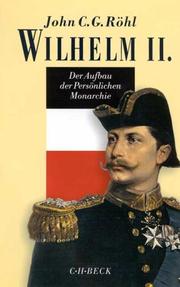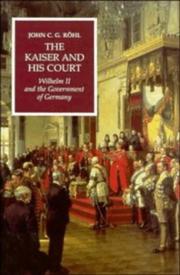| Listing 1 - 4 of 4 |
Sort by
|

ISBN: 3406482295 3406376681 9783406577796 9783406376689 Year: 1993 Publisher: München Beck
Abstract | Keywords | Export | Availability | Bookmark
 Loading...
Loading...Choose an application
- Reference Manager
- EndNote
- RefWorks (Direct export to RefWorks)
William II, German Emperor --- Germany --- Weimar Republic --- Germanii︠a︡ --- Германия --- BRD --- FRN --- Jirmānīya --- جرمانيا --- Nimechchyna --- Gjermani --- Federalʹna Respublika Nimechchyny --- Veĭmarskai︠a︡ Respublika --- Ashkenaz --- Germanyah --- Bundesrepublik Deutschland --- Federal Republic of Germany --- Deutschland --- Repoblika Federalin'i Alemana --- República Federal de Alemania --- Alemania --- República de Alemania --- Bu̇gd Naĭramdakh German Uls --- Kholboony Bu̇gd Naĭramdakh German Uls --- KhBNGU --- ХБНГУ --- German Uls --- Germania --- Republika Federal Alemmana --- Deutsches Reich --- Grossdeutsches Reich --- Weimarer Republik --- Vācijā --- ドイツ --- Doitsu --- ドイツ連邦共和国 --- Doitsu Renpō Kyōwakoku --- Germany (Territory under Allied occupation, 1945-1955) --- Germany (Territory under Allied occupation, 1945-1955 : British Zone) --- Germany (Territory under Allied occupation, 1945-1955 : French Zone) --- Germany (Territory under Allied occupation, 1945-1955 : Russian Zone) --- Germany (Territory under Allied occupation, 1945-1955 : U.S. Zone) --- Germany (East) --- Germany (West) --- Holy Roman Empire --- History --- -Kings and rulers --- -Biography. --- William --- Kings and rulers --- William II --- Biography --- William I, 1871-1888 --- ドイツ レンポウ キョウワコク --- Deguo --- 德国 --- Gėrman --- Герман Улс --- Guillaume II (empereur d'Allemagne ; 1859-1941) --- Allemagne --- 1789-1900 --- 1871-1888 (Guillaume I) --- 1900-1945 --- 1888-1918 (Guillaume II) --- Biographies --- Politique et gouvernement
Book
ISBN: 0582313805 Year: 1970 Publisher: London : Longman,
Abstract | Keywords | Export | Availability | Bookmark
 Loading...
Loading...Choose an application
- Reference Manager
- EndNote
- RefWorks (Direct export to RefWorks)
National socialism. --- Bismarck, Otto, --- Hitler, Adolf, --- Germany --- Politics and government

ISBN: 0521402239 0521565049 1316347346 1316344908 131634567X 1316346218 1316348474 1316347931 1316529827 9781316348475 9781316346211 Year: 1996 Publisher: Cambridge : Cambridge university press,
Abstract | Keywords | Export | Availability | Bookmark
 Loading...
Loading...Choose an application
- Reference Manager
- EndNote
- RefWorks (Direct export to RefWorks)
Kaiser Wilhelm II, Queen Victoria's eldest grandchild, took over the running of the powerful German Reich from Bismarck and within a couple of decades had led it into world war and collapse. How did the Kaiser come to have so much power? Why was there no one to help him steer a less disastrous course? This book analyses these crucial questions with the help of a wealth of new archival sources. The book begins with a character-sketch of the Kaiser which provides new and alarming insights into his personality. It then looks, crucially, at the Kaiser's friends and favourites, the neo-absolutist culture of the court and of Berlin court society, and at the nature of his relationship with the court on the one hand and with the administrative 'pyramid' in Prussia and the Reich on the other. The book makes clear that these bureaucrats and diplomats had neither the means nor the will to oppose the overwhelming determination of the Kaiser and his close friends and advisers in directing the policies of the most dynamic and volatile state in Europe. The dangerous consequences of this situation led to the brink of world war as early as December 1912. A final chapter reveals for the first time the appalling extent and nature of the exiled Kaiser's anti-semitism.
William --- Guillaume --- Views on Jews. --- Et les juifs --- Germany --- Allemagne --- Kings and rulers --- Biography --- Politics and government --- Rois et souverains --- Biographies --- Politique et gouvernement --- 1888-1918 --- William II --- William - II, - German Emperor, - 1859-1941. --- Biography. --- Vilʹgelʹm --- Wilhelm --- Guilelmus --- Wei-lien --- Vilkhelm --- Friedrich Wilhelm Viktor Albert, --- Guillermo --- Monarchs. --- William II, German Emperor
Book
ISBN: 9780521844314 9781139046275 9781107544192 9781107731752 1107731755 1139046276 0521844312 1107720303 1139890220 1107727642 1107730007 110772824X 110754419X Year: 2014 Publisher: Cambridge [etc.] Cambridge University Press
Abstract | Keywords | Export | Availability | Bookmark
 Loading...
Loading...Choose an application
- Reference Manager
- EndNote
- RefWorks (Direct export to RefWorks)
This final volume of John Röhl's acclaimed biography of Kaiser Wilhelm II reveals the Kaiser's central role in the origins of the First World War. The book examines the Kaiser's part in the Boer War, the Russo-Japanese War, the naval arms race with Britain and Germany's rivalry with the United States as well as in the crises over Morocco, Bosnia and Agadir. It also sheds new light on the public scandals which accompanied his reign from the allegations of homosexuality made against his intimate friends to the Daily Telegraph Affair. Above all, John Röhl scrutinises the mounting tension between Germany and Britain and the increasing pressure the Kaiser exerted on his Austro-Hungarian ally from 1912 onwards to resolve the Serbian problem. Following Germany's defeat and Wilhelm's enforced abdication, he charts the Kaiser's bitter experience of exile in Holland and his frustrated hopes that Hitler would restore him to the throne.
William --- Germany --- Allemagne --- Politics and government --- History --- Politique et gouvernement --- Histoire --- Vilʹgelʹm --- Wilhelm --- Guilelmus --- Wei-lien --- Vilkhelm --- Friedrich Wilhelm Viktor Albert, --- Guillaume --- Guillermo --- Arts and Humanities
| Listing 1 - 4 of 4 |
Sort by
|

 Search
Search Feedback
Feedback About UniCat
About UniCat  Help
Help News
News